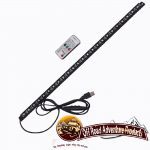Fact or Fiction
Well, is it true? Will a battery be damaged or discharged by letting it sit on concrete?
Why do so many people believe that concrete is a battery enemy? Years ago, batteries could have been electrically discharged by sitting on a concrete floor. My dad, for instance, owned an automotive shop for many years. In fact, I grew up on a creeper. My dad reminded me time after time, “Set that battery on wood! I know batteries discharge on concrete because I’ve witnessed it!” And he was right at that time.
 Historical Basis
Historical Basis
You see, the myth that concrete drains batteries does have some historical basis. Many, many years ago, wooden battery cases encased a glass jar with the battery inside. Any moisture on the floor could cause the wood to swell and possibly fracture the glass, causing it to leak.
Later came the introduction of the hard rubber cases, which were somewhat porous and had a high-carbon content. An electrical current could be conducted through this container if the moist concrete floor permitted the current to find an electrical ground. The wise advice of the old days to “keep batteries off concrete” has been passed down to us today, but it no longer applies because of the advanced technology of today’s batteries.
Today’s Technology
For more than a decade, automotive and commercial battery containers have been made of polypropylene, which is a highly insulative material. In fact, the Interstate Batteries poly material is at least five times more insulative than the old hard rubber. Also, tremendous technological improvements have been made in the seals around the posts and the vent systems, which have virtually eliminated electrolyte seepage and migration.
Battery Discharging
The fact is, all batteries self- discharge whether they’re sitting on the shelf or on concrete. This is why we regularly rotate your inventory. As the temperature increases, a battery’s self-discharge level also increases. Some lead acid batteries discharge 4% – 8% per month at a temperature of 80°F. The level of self-discharge is also contingent upon the type of lead plate alloy plus the age and cleanliness of the battery.
If the battery has a surface layer of acid or grime, which is electrically conductive, it self-discharges more rapidly. This surface layer may actually allow you to measure the DC voltage across the battery’s poly case (using a 10 meg-ohm digital voltmeter). For that reason, we recommend that you always keep batteries clean, whether they’re in storage or in a vehicle.






